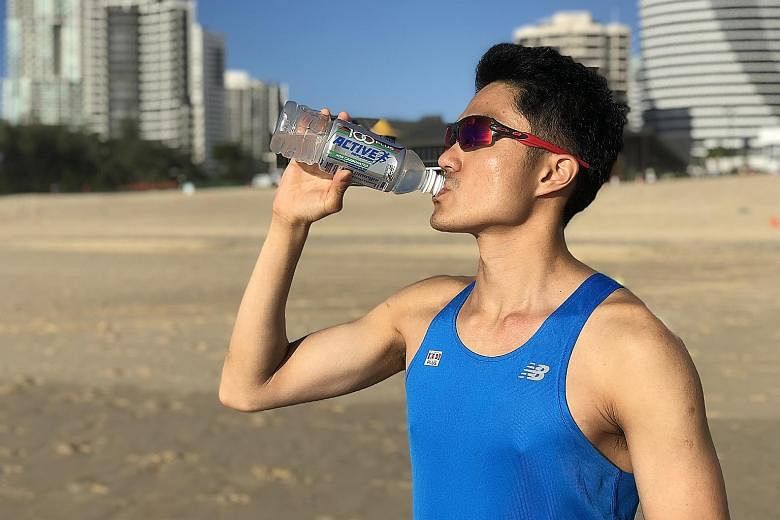Dear Michelle, Roger and Charles, thank you for the questions.
Drinking too little is hazardous, but drinking too much is equally dangerous. Reaching the right balance for your body will aid in optimal performance in a race. But how do we know what this is?
Here are some markers:
DEHYDRATION
Dehydration affects our daily lives. It is common to experience fatigue if you forget to drink water throughout the day. Water is lost not just when we visit the toilet, but also through breathing and perspiration.
Similarly, dehydration has an adverse effect on performance in endurance sport, and may reduce an athlete's performance during training and racing. The effects are further exacerbated by the hot and humid climate in Singapore. There is thus strong emphasis on athletes to stay well-hydrated.
OVERHYDRATION
-
#AskMok
-
MICHELLE
How often should I drink during the race? Should this be different from training?
-
ROGER NG
Is there such a thing called "drinking too much" during the race? I'm afraid of being bloated and I don't drink.
-
CHARLES GOH
What type of hydration do you take in every day? Do isotonic drinks really make a difference?
-
•For more details on the training programme #RunwithMok or to #AskMok, go to straitstimesrun.com
However, consuming fluids in excessive amounts can cause overhydration and lead to dangerous medical conditions. One such medical condition is exercise-associated hyponatremia (EAH), which arises when sodium in the blood is diluted. This in turn causes the sodium concentration in the body to drop to dangerously low levels.
In a medical study involving runners who took part in the 2002 Boston Marathon, it was found that 13 per cent of the 488 sampled runners experienced EAH during the race. Runners who experience EAH typically report to the on-site medical tents for symptoms such as giddiness, headache, confusion and, in severe cases, may even collapse or suffer seizures. Thus, the old adage of "drink as much as possible" does not always apply.
Here are some hydration tips:
OPTIMAL HYDRATION TIPS
At the 2015 International Exercise-Associated Hyponatremia Consensus Development Conference, a panel of experts recommended that runners use thirst as a real-time guide to monitor hydration.
Drinking according to thirst before, during and immediately following exercise is a safe and effective method to gauge hydration.
Consuming sports drinks which contain sodium, such as 100Plus (the official hydration partner for The Straits Times Run), may attenuate the fall in blood-sodium concentrations. However, do not be mistaken as this cannot totally eliminate the risks of EAH - the volume of fluids consumed is more important than the type of fluid. So fret not if you prefer to drink plain water instead.
BEHAVIOURAL TIPS
When at work in the hospital, I keep a bottle of water with me at all times to remind myself to stay hydrated. When I am in the operating theatre and am unable to drink water, I make a conscious effort to drink at least 500ml of water in between each operation. Just by doing so, I feel better during my evening runs. A good guide would be to drink a sufficient amount of water such that your urine is clear.
During a marathon, I consume about 200ml of isotonic sports drinks every 20-30 minutes during a 21/2-hour race. Slight dehydration is expected during long races and it is normal for your body weight to be reduced by up to 3 per cent. There is no need to replenish every drop of water lost through sweat.
BONUS EFFECT
A little-known bonus effect of consuming sports drinks containing sweet carbohydrates is that your sport performance may be boosted.
An interesting study evaluated whether rinsing the mouth with a carbohydrate solution altered the performance of competitive cyclists. It was found that by merely rinsing the sweet solution in the mouth, the time-trial performance of the cyclists improved by an average of 1.1 per cent. The hypothesis is that the brain responds to glucose in the mouth and mediates emotional and behavioural responses which are associated with rewarding stimuli. This then stimulates one to perform at a higher capacity.
So, even if you don't feel like consuming fluids during a race, it would still be a good idea to sip some sports drinks and swirl it in your mouth.
PRACTICAL TIPS
One should get used to consuming sports drinks before a race. I usually stick to one particular brand and use it throughout my entire training cycle and the race.
This eliminates any potential surprises on race day. If you know which drinks will be given out at the hydration booths during the race, be sure to try them out during your training runs to avoid an upset stomach during the race.
As a 100Plus ambassador, my preference is for the non-carbonated 100Plus Active when I am training and running. The drink is formulated to help rehydrate and replenish electrolytes and minerals.
You too, will be able to enjoy ice-cold 100Plus at the various water points during The Straits Times Run. Remember to stay hydrated!


